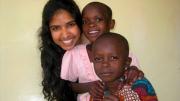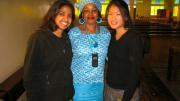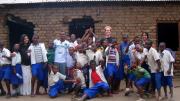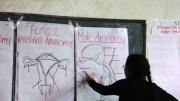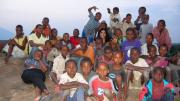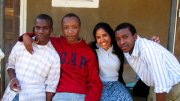In a village in northern Tanzania in the summer of 2008, Rashmi Jasrasaria ’10 was leading a group of Tanzanian women in a discussion about HIV prevention, when one woman raised her hand with a question: “What if I ask my husband to wear a condom and he beats me?”
Jasrasaria didn’t have an easy answer. The curriculum of Support for International Change (SIC), the NGO for which she was volunteering, instructs people to choose one of three options: abstinence, being faithful, or condom use. It encourages women to take responsibility for their own health and ask their husbands to use condoms if they suspect them of being unfaithful. But strong cultural biases against condom use are reinforced by active denunciation from religious leaders—important figures in this highly religious society (roughly evenly divided between adherents to Christianity and Islam in the area SIC serves). Perhaps paradoxically, married men’s infidelity is tacitly accepted. And in the villages where she and other student volunteers worked, says Jasrasaria, “Any semblance of status women have is based on their husbands.”
SIC is well aware that societal factors to some extent inhibit its educational efforts. It tries to draw these issues to the forefront, for frank discussion, in groups like the one Jasrasaria led, and it directs much of its attention to youth education, recognizing that adults’ attitudes are harder to change. But the more Jasrasaria talked with the women of the village, the more interested she became in how women might gain power in their marriages and in Tanzanian society. She became convinced that eradicating HIV would require not just education, but “a new conception of gender in the developing world.”
She came back to Harvard “frustrated by the limitations of what education could do for women,” she says. “A lot of HIV prevention focuses on individual behavior, but individual behavior is often inhibited by structural factors.” At the same time, she was eager to return to Tanzania, enchanted by its natural beauty and the warmth of its people. In fact, she became the official coordinator for SIC at Harvard, using her enthusiasm to recruit several other students to volunteer this past summer.
Eager to put her fieldwork in context, Jasrasaria enrolled in courses that investigated gender’s connections to development and health. For a class with assistant professor of sociology Jocelyn Viterna, she reviewed the literature on HIV prevention projects for women, and women's vulnerability to HIV, around the world. Studying with Nara Dillon, a lecturer in the government department, she analyzed the economic factors affecting women’s empowerment and health in Tanzania. She also learned enough Swahili to conduct most of her interviews directly, so that she needed only occasional clarification, rather than sentence-by-sentence translation, from the translator she had hired.
And she made arrangements to spend the summer of 2009 working with the Arusha Project, an NGO based in that northern Tanzania city. (As one of the departure points for safaris and climbing expeditions to Mount Kilimanjaro and Mount Meru, Arusha is a hub for the country’s tourism industry.) The NGO promotes women’s empowerment through two mechanisms: microfinance and HIV education. With funding through Harvard’s Committee on African Studies, Jasrasaria interviewed the program’s clients about its impact on their lives.
Though she was tremendously impressed with the grit of the women she met, she noticed that those who felt most empowered were single (mostly widowed). Often these women had been disillusioned by marriages to philandering husbands who had contracted HIV and perhaps even transmitted it to them; they had little patience for irresponsible behavior and little interest in getting married again. They were busy running the businesses they had started with their microloans; their days of depending on men were over. The microloans had given them the space to reconstruct their identies as women.
The product of these interviews will be Jasrasaria’s senior thesis, but the Kirkland House social-studies concentrator doesn’t foresee academic research being the sole focus of her career. Although she believes evaluation and analysis are crucial, she herself found the researcher’s lifestyle isolating. Instead, she plans to pursue a career in medicine—but she does see herself returning to Tanzania, “to do something more concrete, like prescribe medicine.”
Because of the strictures of Tanzanian culture’s conservative view of marriage and women’s status within it, she holds out little hope that education alone will shift the balance of power, and change husbands' behavior, in couples that are already married. But her interview subjects emphasized the importance of reaching young women and teaching them to value education, to take responsibility for their health, and to insist on being treated as equals in romantic relationships from the beginning. Jasrasaria agrees that hope lies with future generations. Women who are already married “can’t choose to exercise what they know,” she says. Knowledge’s power lies in its capacity to bring about social change, she says: “Education on its own is not enough."
